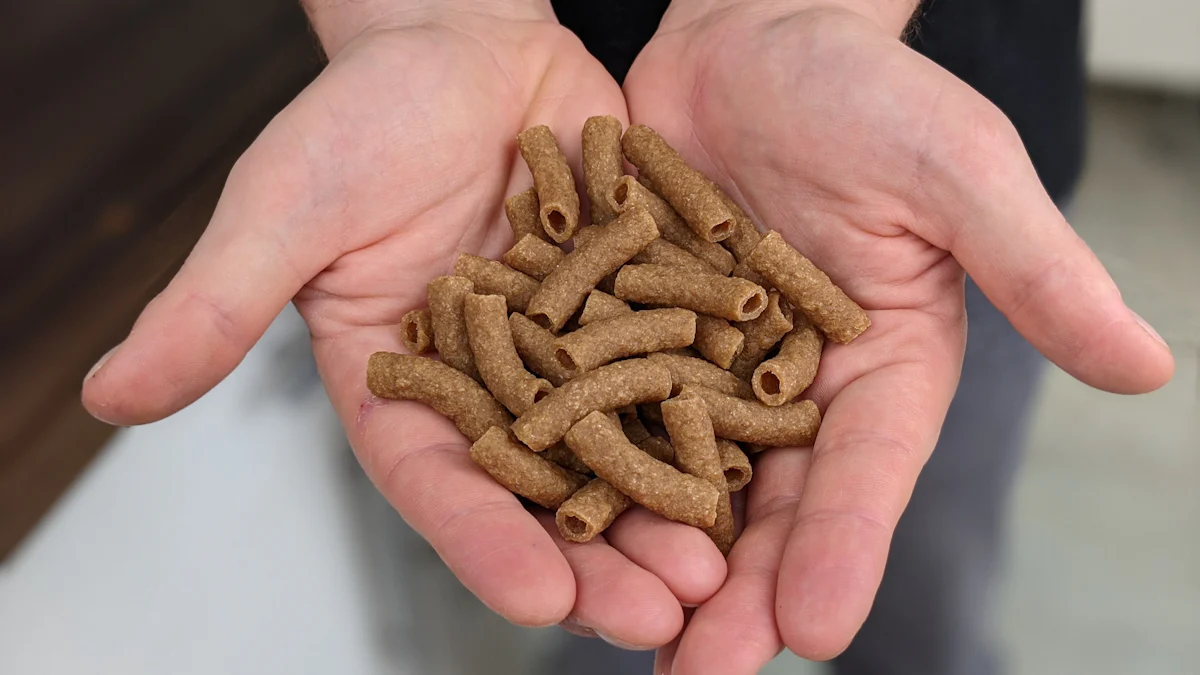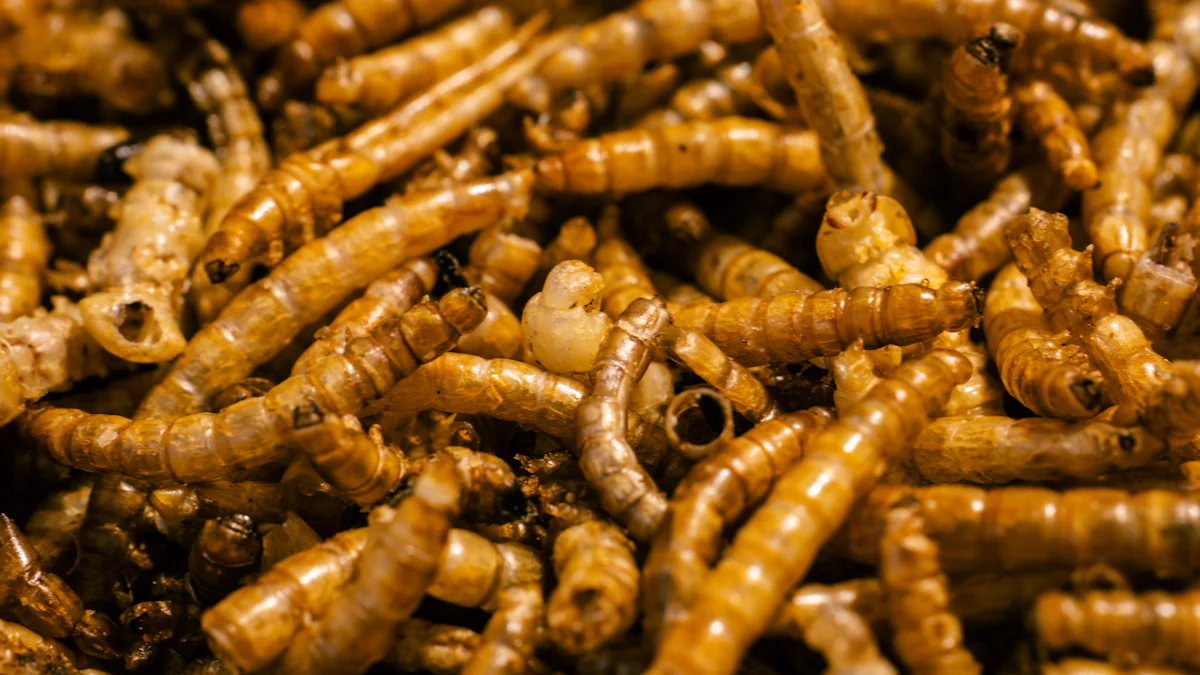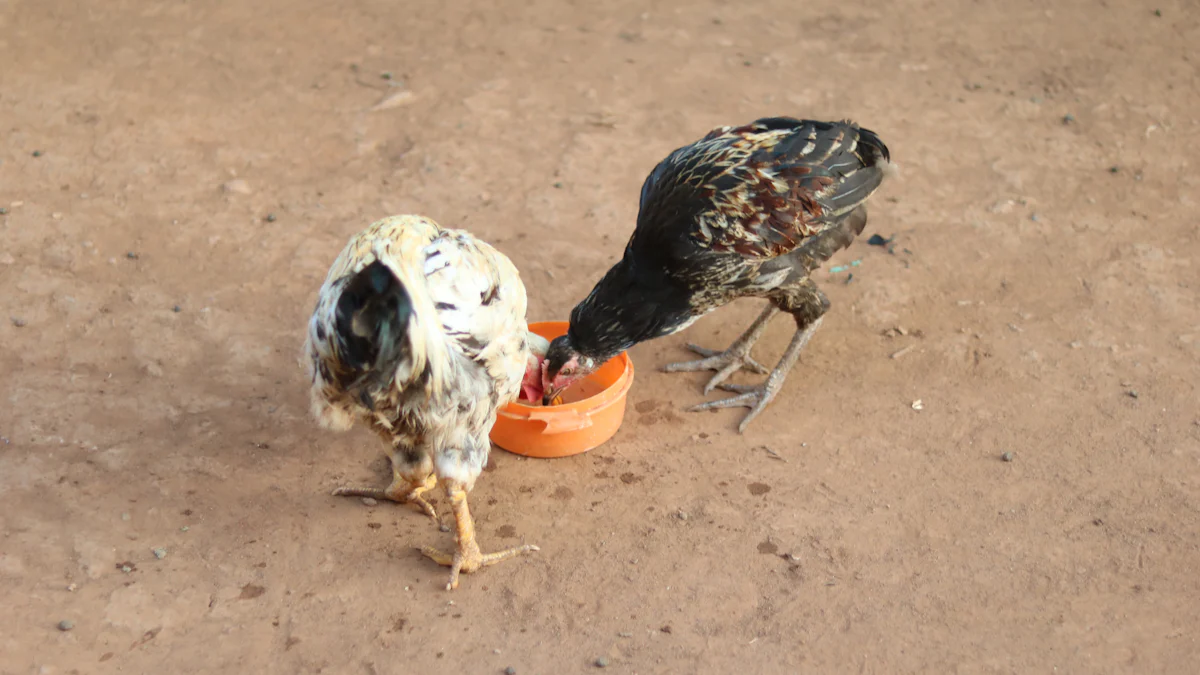
If you’re searching for a nutritious treat, mealworms are good for chickens and make an excellent choice. Packed with protein, they are especially beneficial for egg-laying hens and older birds. During molting, when chickens shed and regrow their feathers, the extra protein from mealworms is crucial since feathers are made up of 85% protein. Additionally, mealworms are good for chickens because they provide essential vitamins like B12, which supports nerve function, and minerals like phosphorus, which promotes strong bones. Just remember to keep treats like these to about 10% of your flock’s diet to ensure they stay healthy.
Key Takeaways
- Dried mealworms are a healthy snack for chickens. They have up to 50% protein, vitamins, and minerals. These nutrients help chickens stay healthy and lay eggs.
- Only give mealworms sometimes. Keep them to 10% of their food. Too many can cause weight gain and stomach problems. A balanced diet is important.
- When chickens lose feathers, mealworms help them grow back faster. The protein in mealworms is great during this tough time.
Nutritional Benefits of Mealworms Good for Chickens

High Protein Content
Protein is one of the most important nutrients your chickens need, and mealworms are packed with it. In fact, dried mealworms contain up to 50% protein by weight, which is much higher than other common feed options like corn or grains. Here’s a quick comparison:
| Feed Type | Protein Content |
|---|---|
| Mealworms | 50% |
| Corn | Lower than 50% |
| Other Grains | Varies, generally lower than mealworms |
This high protein content makes mealworms an excellent supplement for your flock. Protein is crucial for their health, especially for egg-laying hens and older birds. During molting, which happens once a year, chickens need more protein to grow new feathers. These new feathers are made up of 85% protein, so adding mealworms to their diet during this time can make a big difference. Plus, bugs like mealworms are a natural source of protein, vitamins, and amino acids, making them a convenient and healthy choice.
Rich in Essential Vitamins and Minerals
Mealworms aren’t just about protein—they’re also loaded with essential vitamins and minerals that keep your chickens healthy. For example:
- B Vitamins, including B12, support nerve function and overall productivity.
- Phosphorus and calcium are vital for strong bones and eggshell quality.
- Omega-3 fatty acids promote shiny feathers and a strong immune system.
Here’s a breakdown of some key nutrients in mealworms and their benefits:
| Nutrient | Benefit for Chickens |
|---|---|
| Protein | Essential for growth and egg production |
| Essential Amino Acids | Crucial for health and egg quality |
| B Vitamins | Boosts overall health and productivity |
| Calcium | Strengthens bones and eggshells |
| Phosphorus | Supports bone health |
| Omega-3 Fatty Acids | Improves feathers and immune function |
By feeding mealworms, you’re giving your chickens a well-rounded boost of nutrients that contribute to their overall health.
Source of Healthy Fats and Energy
Mealworms are also a great source of healthy fats, which provide energy for your chickens. These fats, including omega-3 fatty acids, help your flock stay active and maintain healthy feathers. Compared to other high-fat feed options, mealworms stand out with their balanced combination of protein and fat:
| Feed Type | Protein Content | Fat Content |
|---|---|---|
| Mealworms | 50% | 30% |
| Grains | Lower than 50% | Lower than 30% |
The fats in mealworms also play a role in boosting your chickens’ immune systems, helping them fight off illnesses. By adding mealworms to their diet, you’re not just giving them a treat—you’re providing the energy and nutrients they need to thrive.
Health Benefits of Mealworms for Chickens
Enhanced Egg Production
If you want your hens to lay more eggs and improve their quality, mealworms are a fantastic addition to their diet. These protein-packed snacks help your chickens stay healthy, which leads to more consistent egg production. The nutrients in mealworms also improve the thickness of eggshells and enhance the rich color of yolks.
Here’s why mealworms are so effective:
- They provide the protein your hens need for growth and body repair.
- Protein plays a key role in feather development and egg production.
- Regularly feeding mealworms can lead to noticeable improvements in egg-laying.
By adding mealworms to your flock’s diet, you’re not just giving them a treat—you’re supporting their ability to produce high-quality eggs.
Support During Molting
Molting can be a stressful time for your chickens, but mealworms can make it easier. Feathers are made up of about 85% protein, so your flock needs extra protein to regrow them. Mealworms, with their 50% protein content, are perfect for this.
Here’s how mealworms help during molting:
- They provide leucine, an amino acid that boosts calcium absorption, which is essential for feather growth.
- The high protein content speeds up feather regeneration, helping your chickens stay warm and healthy.
- Vitamins A and B in mealworms promote tissue growth, improving feather quality and fluffiness.
Adding mealworms to their diet during molting ensures your chickens recover faster and look their best.
Reduced Feather Pecking and Stress
Chickens can get bored or stressed, especially in confined spaces. This often leads to feather pecking, which can harm your flock. Mealworms are a great way to keep your chickens entertained and reduce stress.
Scattering mealworms encourages natural foraging behavior, keeping your chickens active and engaged. This is especially helpful for free-range chickens, as it mimics their instinct to search for food. When your chickens are busy foraging, they’re less likely to peck at each other. Plus, staying active and stress-free promotes their overall health and happiness.
By feeding mealworms, you’re not just providing nutrition—you’re also creating a healthier and more harmonious environment for your flock.
Feeding Mealworms to Chickens Responsibly

Recommended Quantities and Frequency
When it comes to feeding mealworms, moderation is key. These protein-packed treats are great for your flock, but overfeeding can lead to health problems. Here’s a simple guide to keep things balanced:
- Offer about 10–15 mealworms per chicken, once or twice a week.
- Treats, including mealworms, should make up no more than 10% of your chickens’ daily diet.
- During high-stress periods, like molting, you can slightly increase the frequency but still keep portions small.
Mealworms are high in protein and fat, so they’re best used as a supplement to your chickens’ regular feed. Adult laying hens need a diet with around 16% protein, and mealworms can help meet that requirement without overloading their system.
How to Introduce Mealworms to Chickens
If your chickens have never tried mealworms before, don’t worry—it’s easy to get them interested. Start by sprinkling a few dried mealworms on top of their regular feed or mixing them with a favorite treat. Chickens love variety, so this small addition can quickly grab their attention.
For picky eaters, try rehydrating the mealworms in warm water. This softens their texture and makes them more appealing. You can also drizzle a little apple cider vinegar or seed oil, like flaxseed, over the mealworms to enhance the flavor.
Remember, mealworms are a treat, not a replacement for their main feed. Use them to add extra nutrients and variety to your flock’s diet.
Tips for Feeding Reluctant Chickens
Some chickens might be hesitant to try mealworms at first, but a little creativity can help. Scatter mealworms around the coop or yard to encourage natural foraging behavior. Chickens love to hunt for food, and this activity keeps them entertained while introducing them to the new treat.
You can also mix mealworms with other favorites, like watermelon or fresh peas, to make them more enticing. If your chickens still aren’t interested, rehydrating the mealworms can make a big difference. The softer texture often appeals to reluctant eaters.
Looking for alternatives? Dried maggots, fresh peas, or melon slices can work alongside mealworms to keep your flock happy and engaged. These options provide variety and ensure your chickens get the nutrients they need.
Potential Risks of Feeding Mealworms
Risks of Overfeeding
Mealworms are packed with protein and fat, but too much of a good thing can harm your chickens. Overfeeding mealworms can lead to obesity, which affects their mobility and overall health. You might notice your chickens gaining weight or struggling to move around. Obesity can also reduce egg production and increase the risk of reproductive problems or heart disease.
Feeding too many mealworms can upset your chickens’ digestive systems. Diarrhea or unusual droppings are common signs of this. A diet that’s too high in protein and fat may also cause nutrient deficiencies because your flock isn’t getting enough variety. Young chicks are especially vulnerable to developmental issues if their diet lacks essential nutrients.
Here’s a quick list of potential risks:
- Obesity from excessive calories and protein.
- Liver problems due to an imbalanced diet.
- Digestive issues like diarrhea.
- Developmental problems in young chicks.
Importance of Choosing High-Quality Mealworms
Not all mealworms are created equal. To keep your chickens healthy, choose mealworms from a reputable supplier. High-quality mealworms are free from harmful additives and packed with nutrients.
When shopping, look for plump, active mealworms. Store them in a cool, dry place away from sunlight to maintain their quality. Always handle them with clean hands to avoid contamination.
Addressing Common Feeding Challenges
Feeding mealworms comes with its own set of challenges. For starters, mealworms should only be a supplement, not the main feed. Overfeeding can lead to overweight chickens, so moderation is key.
Chickens also need access to grit to help digest the mealworm exoskeletons. If your flock seems hesitant to try mealworms, scatter them over their regular feed or mix them with a favorite treat. Rehydrating dried mealworms can also make them more appealing.
“Mealworms are rich in protein and fat, so feed them sparingly, especially during stressful times like molting or cold weather.”
By keeping these tips in mind, you can safely incorporate mealworms into your flock’s diet.
Dried mealworms are a fantastic treat for your chickens when fed responsibly. They’re packed with protein, vitamins, and healthy fats that boost egg production, support molting, and improve overall health. By keeping treats to 10% of their diet and offering them in moderation, you’ll ensure your flock stays happy, healthy, and productive.
FAQ
What are the benefits of feeding mealworms to chickens during molting?
Mealworms provide protein, which chickens need to regrow feathers. Feathers are 85% protein, so mealworms help speed up feather growth and keep your flock healthy.
Can mealworms replace regular chicken feed?
No, mealworms are a treat, not a replacement. They should make up only 10% of your chickens’ diet to ensure balanced nutrition.
How do I store dried mealworms?
Keep them in a cool, dry place away from sunlight. Use an airtight container to maintain freshness and prevent contamination.


